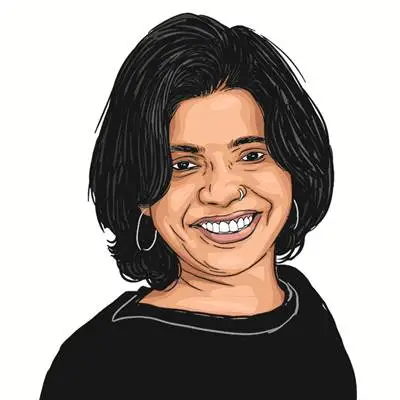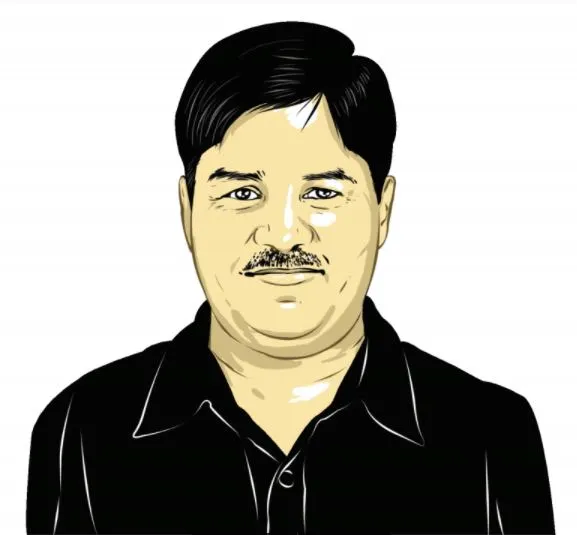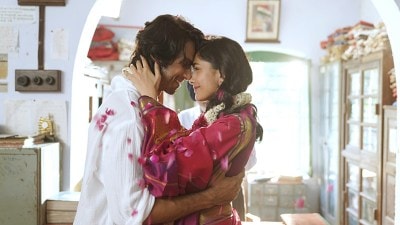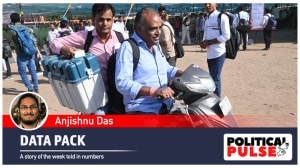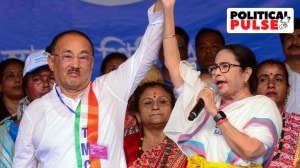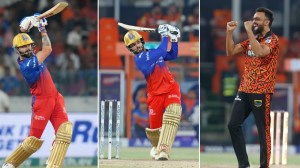- India
- International
A new red line: What Nupur Sharma moment means for the BJP
As the remarks on Prophet spun out of control, the BJP faced its first blowback on its handling of minority issues.
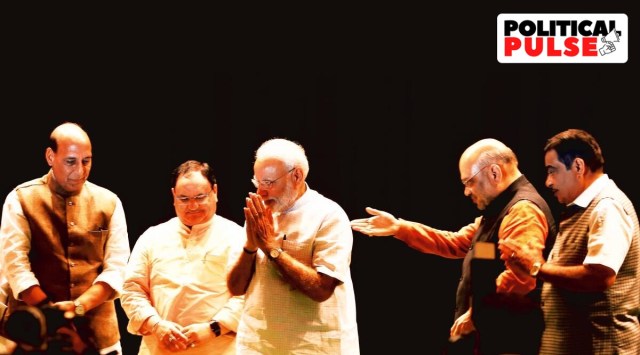 Prime Minister Narendra Modi ,Home Minister Amit Shah, Defence Minister Rajnath Singh, and BJP President J P Nadda during the BJP Parliamentary Party meeting on july 2 2019. (Express/Renuka Puri)
Prime Minister Narendra Modi ,Home Minister Amit Shah, Defence Minister Rajnath Singh, and BJP President J P Nadda during the BJP Parliamentary Party meeting on july 2 2019. (Express/Renuka Puri)A raucous TV debate and a string of tweets by two BJP spokespersons — normal grist to the Hindutva mill. But as their remarks on the Prophet spun out of control, the BJP faced its first blowback on its handling of minority issues. What followed was a swift crackdown and a govt statement saying it “respects all religions”. Liz Mathew explores what this moment means for the BJP, a party that’s in expansion mode and is dominated by the formidable political capital of the Prime Minister. With Shyamlal Yadav
A FEW minutes before 11 pm on June 1, a senior BJP leader got an angry call from a senior colleague. “What has this Naveen Jindal tweeted?” Until then, the leader, who is part of the media unit, had no hint of the storm that was to hit the party and the government. “I quickly trawled through Jindal’s tweets. I was shocked. He had been tweeting about the Prophet for a while by then and I had no clue.”
Six days earlier, BJP party spokesperson Nupur Sharma had, in a Times Now panel discussion, made derogatory references to the Prophet while replying to another panelist. Both Jindal’s tweet and Sharma’s remarks, at first, seemed the normal grist to the Hindutva mill that cranks right through the day on social media and prime time TV but as the weekend began and the videoclip went viral, complete with subtitles in English, alarm bells began ringing. Abusing minorities is par for the course for many TV talking heads but this was the Prophet. A line had been breached and the Islamic world was waking up.
Things came to a head last Sunday with hashtags such as ‘Boycott Indian Products’ and statements by public figures and influencers in the Gulf region. The 7.6-million diaspora, the $37-billion remittances and a diplomacy that pivoted around Prime Minister Narendra Modi’s personal connection with many of the leaders there — all added up to unprecedented action. On June 5, the party sacked both the spokespersons over their remarks on the Prophet, and the government, facing a massive backlash from the Gulf nations, issued a statement saying it “accords the highest respect for all religions” and said that the remarks of the ruling party’s spokespersons “do not, in any manner, reflect the views of the Government of India. These are the views of fringe elements”.
 People stage a protest over the controversial remarks made by two now-suspended BJP leaders about Prophet Mohammad, at Bhaderwah in Doda district, Friday, June 10, 2022. (PTI Photo)
People stage a protest over the controversial remarks made by two now-suspended BJP leaders about Prophet Mohammad, at Bhaderwah in Doda district, Friday, June 10, 2022. (PTI Photo)
The immediate crisis was tamped down but after Friday prayers, protests erupted in more than a dozen cities across the country with two protesters dying of bullet injury in Jharkhand’s Ranchi.

For the BJP, the incident and its aftermath present a singular challenge: for a party that is now India’s largest — and growing — how does it walk the tricky line between the cultural revivalism and ideological project that forms the bedrock for its growth and the emotions it has uncorked in the process among millions of Indians? So far, hate speeches on the campaign trail, violence against minorities, bulldozers targeting a section, protests against NRC/CAA, love jihad laws and the Karnataka hijab controversy — all have kept the pot simmering but what happens when it boils over? For a party this big and getting bigger, where does the core end and the ‘fringe’ begin? Who guard these walls and how impermeable are they? As the latest controversy shows, not very.
Many party leaders admit that even as the BJP is expanding its footprint across the country — with 180 million members, the “world’s largest party” rules almost 50 per cent of India’s billion-plus population — it is grappling with newer and unforeseen challenges.
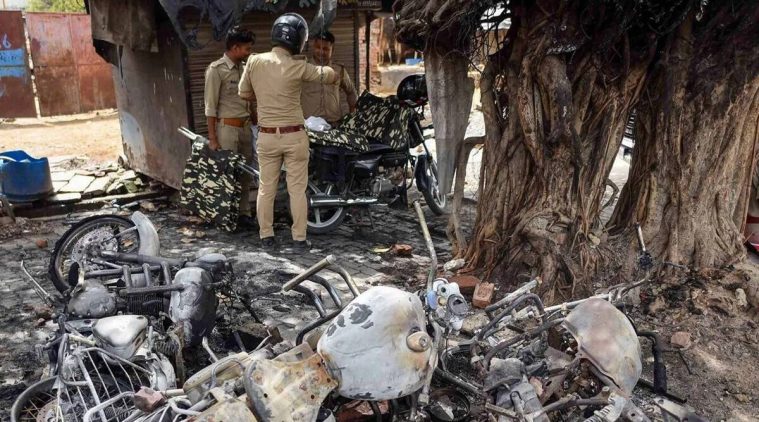 Charred remains of police vehicles in Prayagraj, Saturday, a day after clashes during protest against now-suspended BJP leader’s remark against the Prophet. (PTI)
Charred remains of police vehicles in Prayagraj, Saturday, a day after clashes during protest against now-suspended BJP leader’s remark against the Prophet. (PTI)
There is an acknowledgement that instances like the recent one involving Sharma and Jindal threw the party “off track” and that the unprecedented disciplinary action against them was an attempt to correct that. As a leader put it, “When someone tries to derail the party’s programme, it is our duty to fix things and put the rail back on track.”
So, what’s the track the BJP has chosen for itself?
“It’s very clear: The BJP is in expansion mode. Prime Minister Modi has taken up the task of cultural revivalism. The construction of the Ram mandir is on track, Gyanvapi and Mathura issues will be resolved through the courts and we are moving towards a Uniform Civil Code. Amidst these, insulting the Prophet does not go well with the BJP’s stature today. You can expose Muslims, slam terrorist activities, but humiliating the Prophet is crossing a red line. Both Nupur and Naveen have crossed all limits of civility,” said a BJP Chief Minister.
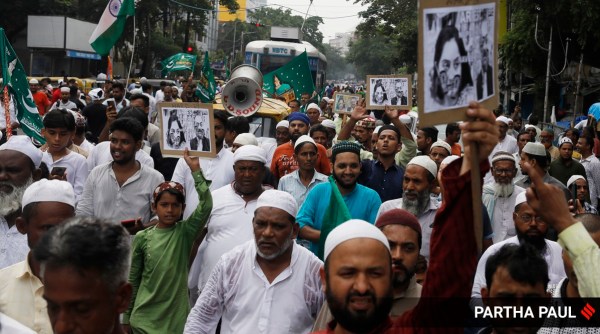 Protests in Park Circus area in Kolkata on Friday over remarks made by ex-BJP spokespersons on Prophet Mohammad. (Express Photo by Partha Paul)
Protests in Park Circus area in Kolkata on Friday over remarks made by ex-BJP spokespersons on Prophet Mohammad. (Express Photo by Partha Paul)
That the BJP’s “stature”, which this leader spoke about, is closely linked to the Prime Minister’s is no secret — evident in a string of statements made by the party and the government that invoke the PM and his “mission”. Indeed, in a government and party that is dominated by the personality and the formidable political capital of the Prime Minister, a blowback like the one last weekend had to be quickly doused.
The role of BJP 2.0 is, according to a number of party leaders, shaped and defined by the single-minded focus of “supporting Prime Minister Modi’s Mission”. At least four senior leaders, including Union Ministers and party general secretaries, said that in his interactions with party leaders, Modi has often urged them to stick to “the development agenda” of the Central government.
“In our meetings, including the recent Jaipur meeting with general secretaries, Modiji said that party leaders should not do anything that derails the government’s agenda or makes the BJP or the government go on the defensive in the eyes of the public,” said one of them.
The Chief Minister who earlier spoke on condition of anonymity pointed out that it was Prime Minister Modi’s intervention that “stopped states who were keen on introducing Gita in the school curriculum” and that he told them that it would open a Pandora’s box as the Bhagavad Gita is an entirely Hindu scripture.
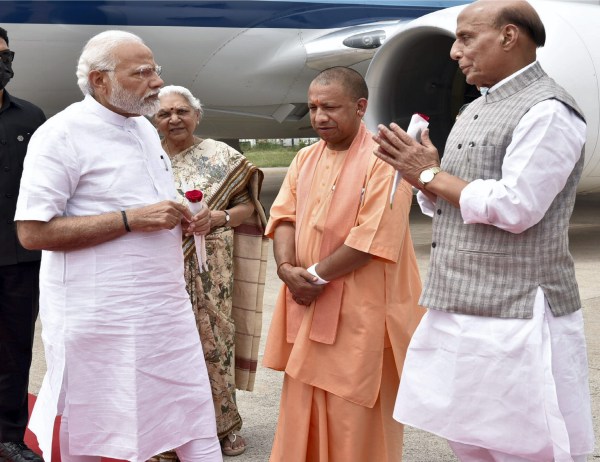 Lucknow: Prime Minister Narendra Modi being welcomed by Defence Minister Rajnath Singh upon his arrival to inaugurate the Ground Breaking Ceremony @3.0 of the UP Investors Summit, in Lucknow. (PTI)
Lucknow: Prime Minister Narendra Modi being welcomed by Defence Minister Rajnath Singh upon his arrival to inaugurate the Ground Breaking Ceremony @3.0 of the UP Investors Summit, in Lucknow. (PTI)
Eight years into the government and 20 years of Modi as a public figure have given the party and the government many platforms to reinforce and communicate the message of a Prime Minister “who wants to take everyone along” and soften the hard edges of the big picture. Many point to the way the Central government, in an affidavit to the apex court, in an unusual departure from tradition and procedure, attributed its change in stance on the issue of sedition to the Prime Minister who “had expressed clear and unequivocal views in favour of protecting civil liberties, respect for human rights and believed that outdated colonial laws had no place in the country celebrating its 75th year of Independence”. This, at a time when the party’s governments have weaponised the sedition law to deal with dissidence.
🚨 Limited Time Offer | Express Premium with ad-lite for just Rs 2/ day 👉🏽 Click here to subscribe 🚨
There are other instances, too.
On May 12, addressing beneficiaries of Centre-run schemes in poll-bound Gujarat, Modi hinted that he was ready for a third term, saying, “It is not enough that I should rest now, (thinking) that everything that has happened is good. No. My dream is saturation…meet your target 100 per cent.” The focus of the PM’s speech, unusually for a poll-bound state, stayed on welfare measures.
The message, therefore, that the party sought to drive home with its strict action against Sharma and Jindal was: “Do not spoil the narrative”.
“It has been eight years of the government – eight years of development, infrastructure development, welfare initiatives, start-ups, investment and more than two years of Covid management. A strong narrative has been seeded, built and amplified and there has been concerted political effort to move the narrative towards it. But this incident distracted all of it. It undermined the huge amount of work and efforts that had gone into the government and governance,” said a Union Minister.
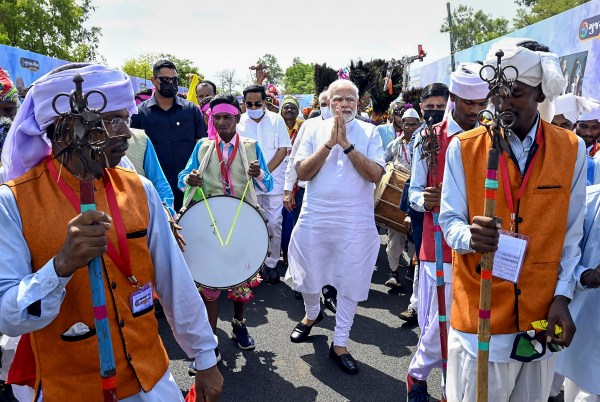 Navsari: Prime Minister Narendra Modi receives traditional welcome during his visit to Navsari. (PTI Photo)
Navsari: Prime Minister Narendra Modi receives traditional welcome during his visit to Navsari. (PTI Photo)
So how does this then tie in with a string of discordant voices of hate that have come out from the BJP, not just from the “fringe”, but many from among the mainstream?
The chief of a state unit of the party, while seeking to distance the PM from some of his controversial remarks, said, “The Prime Minister has always insisted that government schemes are for people of all religions and communities and that we cannot differentiate among people even if there are some protests from our core support base. It’s true that some senior leaders have made inflammatory remarks but they have been immediately warned. Union Minister Giriraj Singh, party MPs Tejasvi Surya, Pragya Thakur, Sakshi Maharaj… such people were repeatedly warned by the leadership,” he said. He, however, admitted that sometimes they have to be “given a long rope considering their contribution to the party”.
BJP leaders also dismiss suggestions that the government wouldn’t have acted if not for the massive outrage from Gulf countries, where India has a large expat population.
“Unlike what the ‘liberals’ think, it was not diplomatic pressure that made the Prime Minister direct the party to take action against the spokespersons. Of course, it’s a matter that the government and the party are concerned about because we share cordial ties with those nations. But the relationship is mutual, never one-sided. The action (against the spokespersons) was also because their remarks went against what the RSS and the BJP consider as ethics. No genuine BJP leader or the RSS has ever made a derogatory statement against the Prophet or Jesus Christ. It’s not what we believe,” said a BJP leader who is familiar with the functioning of the RSS.
 BJP MP & Bollywood actress Hema Malini during ‘Report to Nation Programme’ of BJP on completion of eight years of Prime Minister Narendra Modi’s government, in Mathura, Friday, June 3, 2022. (PTI Photo)
BJP MP & Bollywood actress Hema Malini during ‘Report to Nation Programme’ of BJP on completion of eight years of Prime Minister Narendra Modi’s government, in Mathura, Friday, June 3, 2022. (PTI Photo)
Is the fringe then becoming the mainstream, as some in the Opposition have been saying?
Claiming that the party is clear about who is fringe and who isn’t, a leader said, “It has never been the language of the BJP or the RSS. Nupur Sharma decided to talk like Kapil Sharma. She should have realised that he is the fringe and talking his language would make her the fringe.”
V D Sharma, Madhya Pradesh state BJP president, said, “As far as action against Nupur Sharma is concerned, it is upon us as individuals as to how we present our party. Say, a video of my worker drinking a cold drink gets circulated as alcohol, it becomes fodder for the Opposition to tarnish our image.”
The delay in action against the two spokespersons, a leader argued, was because of “optimism or over-confidence”. “Sometimes you feel that things will die down on their own. Or you are over confident that you are too big to get affected by such a small incident,” he said, adding that expecting Prime Minister Modi to come out and make a public statement on the issue is “ too much”.
“You cannot expect things to be handled the way you want. The Prime Minister will speak, but he will choose his time and venue,” the leader said.
BJP leaders also dismiss the suggestion that this incident and the BJP’s reaction to it point to an inflection point for the party and its handling of minority issues. “You can attack Christians on the issue of conversion. But that does not mean you humiliate or attack Jesus Christ. Similarly, you can criticise the Muslims on issues like triple talaq, its anti-women approach etc. You can hit out a terrorists and terrorism or a community’s involvement in anti-national activities, but that should not be by ridiculing the Prophet.”
BJP strategists point out that for more than a year, both the BJP and its ideological parent, the RSS, have been “sending out signals” on the need to “stick to the fundamentals”.
Leaders pointed to the recent statement by RSS chief Mohan Bhagwat, when he said, ‘Don’t go looking for a shivling in every mosque’, and made it clear that the RSS was not in favour of launching any other movement (andolan) after Ayodhya on temple-mosque issues. While justifying the claims on the Gyanvapi mosque in Kashi, Bhagwat went on to make a distinction between “Islamic invaders” and Indian Muslims, whose ancestors, he said, were Hindus.
“Bhagwatji’s remarks should be seen along with the one he made in July 2021 (‘Hindu-Muslim DNA is one,’ he said at a book launch) and his 2018 speech at Vigyan Bhawan, where he said Hindu Rashtra cannot be imagined without Muslims. RSS never talked about mosques beyond those at Ayodhya, Mathura and Kashi. So his shivling message was to the fringe elements (in the RSS),” said an RSS leader, adding that the RSS leadership is concerned about the growing “fringe” within the outfit, particularly those who have come up after 2014, who “would say anything to come to the limelight”.
Sources in the RSS say that since 2014, they have been grappling with a key question: How to calibrate the RSS’s stand on minority issues.
They say the Sangh’s sampark vibhag has prepared a long list of Muslim intellectuals they can reach out to and convince that the RSS is not against Muslims or Islam as a religion but against those who are anti-India.
Said a long-time pracharak, “This is our long-term strategy. (Muslims) may or may not vote for the BJP but sooner or later, they will realise that we are for the betterment of their society.”
Sources say a section in the RSS is of the view that they need to stay away from issues of faith of the minority community. This section believes that issues of population control and the UCC should not be taken up on priority.
RSS sources also admit that “controlling the mob” is easier said than done. From being an organisation that has always been on the lookout for more members, the RSS is now careful about who gets in, with sources saying the effort is to induct more professionals, academics and government employees.
Is this then an admission that the genie that has been uncorked since 2014 is now too big to be bottled up again?
The action against Sharma and Jindal has triggered some uneasiness among the spokespersons, especially the younger lot and those in the state units. According to one of them, the remarks by Sharma and Jindal were “in reaction to the outrageous remarks” made against Hindu Gods.
“We are party soldiers, we go to defend the party as per the instructions given by the party. Sometimes, in heated debates, there could be some reactions — Nupur’s was a reaction. So some of us feel that the action was unfair,” said a spokesperson.
“It is just wrong timing,” said a leader from the party’s UP unit. “Her remark was blown out of proportion to create a controversy and target the BJP and the government.”
Party sources in the Uttar Pradesh, which is the epicentre of the BJP’s cultural revivalism project, say that while there have been no guidelines or instructions to the cadre defining what’s permissible and what’s not, they have been told not to react to the Nupur Sharma incident “till the matter settles down”.
Earlier, when communal tension broke out in Kanpur on June 3 over the Prophet remarks – on a day Prime Minister Modi and President Ram Nath Kovind were visiting – the party asked its leaders, along with its state spokespersons, to not react to the clashes.
In MP, a party spokesperson said on condition of anonymity, “What Nupur Sharma said was in the heat of the moment. When we go for television debates, people from both sides indulge in such talks.”
“Kabhi kabhi do steps peeche lene chahiye, one cannot win all fights. After all, the country comes first, then the party and finally the individual,” the leader added while calling it a “temporary setback” for the party.
Some of the senior leaders even hope that the developments “will ultimately benefit the BJP”. According to an office bearer of the party, the BJP will “further gain” as “the Hindus, including the moderates, would not like to see India being cornered like this.”
Newsletter | Click to get the day’s best explainers in your inbox
Though few admit it, the Nupur Sharma incident and the events since then — the crackdown, the government statement on “according the highest respect for all religions” and the protests in several parts of the country after Friday prayers — mark the first blowback for the BJP over its handling of minority issues.
While party spokespersons and leaders talk of a red line being breached in this instance, it’s a line that is usually beholden to the one drawing it.
Addressing the diaspora in Tokyo on May 23, while talking about how he is always up for a challenge, Modi had said, “Mujhe makkhan par lakeer karne mein maza nahi aata hai, main patthar par lakeer karta hoon (I do not enjoy drawing a line on butter, I enjoy drawing a line on stone).”
Sharma and Jindal saw a line, whether that was on butter or stone will shape the BJP’s challenge as its electoral juggernaut rolls on.
With inputs from ENS Lucknow & Bhopal
Apr 25: Latest News
- 01
- 02
- 03
- 04
- 05











